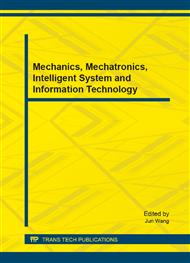[1]
Hale.J. Functional differential equations, New York: Springer-Verlag, (1977).
Google Scholar
[2]
K.Q. Gu. An integral inequality in the stability problem of time-delay system. Proceedings of 39th IEEE Conference on Decision and Control 39, 2000, 2805–2810.
Google Scholar
[3]
E. Fridman, U. Shaked. An improved stabilization method for linear time-delay systems. IEEE Transactions on Automatic Control, 47(2002) 1931-(1937).
DOI: 10.1109/tac.2002.804462
Google Scholar
[4]
J.P. Richard. Time-delay systems: An overview of some recent advances and open problems. Automatica 39(2003) 1667–1694.
DOI: 10.1016/s0005-1098(03)00167-5
Google Scholar
[5]
M. Wu, Y. He, J. H. She and G. P. Liu. Delay-dependent criteria for robust stability of time -varying delay systems. Automatica, 40(2004) 1435-1439.
DOI: 10.1016/j.automatica.2004.03.004
Google Scholar
[6]
H.Y. Shao. Delay-dependent approaches to globally exponential stability for recurrent neural network. IEEE transcations on Circuits Systems II, 55(2008) 591–595.
DOI: 10.1109/tcsii.2007.916727
Google Scholar
[7]
H.Y. Shao. New Delay-dependent stability criteria for systems with interval delay. Automatica, 45(2009) 744–749.
DOI: 10.1016/j.automatica.2008.09.010
Google Scholar
[8]
R. Sipahi, T. Vyhlłdal, S. -I. Niculescu, Pierdomenico Pepe. Time Delay Systems: Methods, Applications and New Trends. Springer, (2012).
Google Scholar
[9]
Y. He, Q. -G. Wang, C. Lin, M. Wu. Delay-range-dependent stability for systems with time- varying delay. Automatica 43(2007) 371–376.
DOI: 10.1016/j.automatica.2006.08.015
Google Scholar
[10]
Y. Xia, Y. Jia. Robust stability functionals of state delayed systems with polytopic type uncertainties via parameter-dependent Lyapunov functions. International Journal of Control, 75 (2002) 1427–1434.
DOI: 10.1080/0020717021000023834
Google Scholar
[11]
C. Hua, X. Guan, P. Shi. Robust backstepping control for a class of time delayed systems. IEEE Transactions on Automatic Control, 50(2005) 894–899.
DOI: 10.1109/tac.2005.849255
Google Scholar
[12]
X. -M. Zhang, M. Wu, J. -H. She, Y. He. Delay-dependent stabilization of linear systems with time-varying state and input delays. Automatica, 41(2005) 1405–1412.
DOI: 10.1016/j.automatica.2005.03.009
Google Scholar
[13]
H. Gao, C. Wang. A delay-dependent approach to robust H1filtering for uncertain discrete-time state-delayed systems. IEEE Transactions of Signal Processing, 52(2004) 1631–1640.
DOI: 10.1109/tsp.2004.827188
Google Scholar
[14]
H. Liu, F. Sun, K. He, Z. Sun. Design of reduced-order H1 filter for Markovian jumping systems with time delay. IEEE Transactions on Circuits and Systems (II), 51(2004) 607–612.
DOI: 10.1109/tcsii.2004.836882
Google Scholar
[15]
S. Xu, J. Lam, S. Huang, C. Yang. H1 model reduction for linear time-delay systems: Continuous-time case. International Journal of Contro, 74(2001) 1062–1074.
DOI: 10.1080/00207170110052194
Google Scholar
[16]
J. Lam, H. Gao, C. Wang. Stability analysis for continuous system with two additive time-varying delay components. System and Control Letters, 56(2007) 16-24.
DOI: 10.1016/j.sysconle.2006.07.005
Google Scholar
[17]
H. Gao, T. Chen, J. Lam. A new delay system approach to network-based control. Automatica, 44(2008) 39–52.
DOI: 10.1016/j.automatica.2007.04.020
Google Scholar
[18]
H. Wua, X. Liao,W. Feng, S. Guo,W. Zhang, Robust stability analysis of uncertain systems with two additive time-varying delay components, Applied Mathematical Modelling, 33(2009)4345-4353.
DOI: 10.1016/j.apm.2009.03.008
Google Scholar
[19]
H.Y. Shao, Z.Q. Zhang, Stability and stabilization for systems with two additive time-varying delay components. Proceedings of the 30th Chinese Control Conference, July 22-24, 2011, Yantai, China, 1119–1124.
Google Scholar
[20]
Rajeeb Dey, G. Ray, Sandip Ghosh, A. Rakshit, Stability analysis for continuous system with additive time-varying delays: A less conservative result. Applied Mathematics and Computation 215(2010) 3740–3745.
DOI: 10.1016/j.amc.2009.11.014
Google Scholar
[21]
X.L. Zhu, X. Du. New results of stability analysi for systems with two additive time-varying delays. Proceedings of the 31th Chinese Control Conference, July 25-27, 2012, Hefei, China, 1452–1457.
Google Scholar
[22]
PooGyeon Park, Jeong Wan Ko, Changki Jeong, Reciprocally convex approach to stability of systems with time-varying delays. Automatica, 47(2011) 235–238.
DOI: 10.1016/j.automatica.2010.10.014
Google Scholar


